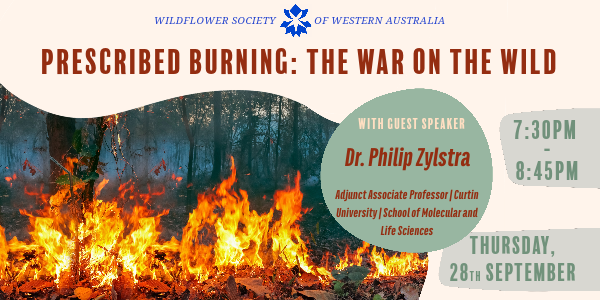
- This event has passed.
Webinar: Prescribed Burning: the War on the Wild
28 September, 2023 @ 7:30 pm - 8:45 pm
Free
Please join us for our webinar with guest speaker Dr. Philip Zylstra, Adjunct Associate Professor from the School of Molecular and Life Sciences, Curtin University.
The quantity of tickets needing to be reserved is based on how many individual devices will be using the webinar link, not how many people will be viewing the webinar from one device. I.e. if two people will be viewing the webinar on one account/device, only one ticket needs to be reserved.
Make sure you like our Facebook Page and click “going” on our Facebook Event to stay up-to-date with the latest!
Summary of Dr. Philip Zylstra’s presentation:
The idea that we risk catastrophic bushfires unless we reduce fuel loads is a recent conceit. Since the deep time years of Gondwana, Australian forests have provided refuge that allowed fire-sensitive species to thrive without human intervention. The use of fire even by our ancient First Nations is a comparatively recent blink on this scale, and all indications are that these cultures developed carefully-controlled approaches that limited fire to small, targeted locations. Broadscale burning was not used to deliberately transform a landscape until the British invasion of Australia, but this was no tool to reduce fuel loads. Invasion fire was explicitly employed to tame the wild – to create agricultural land, break the hold of tall dark forests in the hills and mountains, to subdue the earth. Elders commented that invaders lit fire and let it run “like a child that loved destruction”. While the arrival of humans to Australia is not marked in the charcoal by so much as a pulse, the British invasion dominates the charcoal records: a hockey stick graph even more inconvenient than our impact on the climate. Close observers watched invasion fire transform the forests, filling open understoreys with impenetrable regrowth, or replacing moss and ferns with dry, flammable shrubs. Criticism from these observers was not silenced until the game changed in the late 1950s, when U.S. foresters developed the concept of the ‘fuel load’. Based on observations of pine plantations, foresters argued that without human intervention, the increase in forest biomass equated directly to an increase in fire risk. Biomass – the weight of all non-human life, the weight of terrestrial carbon storage – was now classified as a hazard. The concept fit so perfectly with the thinking of people tasked to subdue the earth that Australian Governments acted quickly to enshrine it into law In the decades since, sound science has established that fire risk and fuel load are unrelated, and has validated the observations that fire does drive dense regrowth. My work has built on this, developing a mechanistic understanding of fire and melding it with ecology to demonstrate a stark reality: biomass in disturbed forests feeds fire, but it calms it if the forest is allowed to mature. With each extreme fire season we hear seasoned veterans claim that fire has “broken all the rules”; but we don’t set the rules. The laws of deep time run counter to our thinking, and time is running out for us to end the war on the wild and reconcile with them. Failure to do so will doom us as an invasive species destined to burn out in a blaze of destruction, but reconciliation provides a pathway to maximising biodiversity, carbon storage, and the welfare of our own species.
The Wildflower Society uses its independent technical knowledge of WA’s wildflowers to help you better know, grow, enjoy and conserve the wildflowers of Western Australia.
We are committed to providing help to the following…
